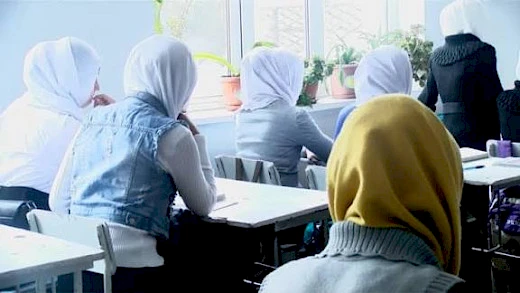Hijab in schools sparks debate again in Northern Cyprus

With the start of the new school year in Northern Cyprus, debates over the wearing of headscarves by students have flared up once more. This issue, which has been fueling sharp discussions in society for several years, is again at the center of attention among teachers, parents, and politicians.
Tahir Gökçebel, General Secretary of the secondary education teachers’ union KTOEÖS, stated that in Bekirpaşa Lisesi and Atatürk Meslek Lisesi, female students wearing headscarves were admitted to classes with the support of representatives from the Turkish Embassy. According to him, this is part of an ideological transformation that Turkey’s ruling AK Parti seeks to promote through the education system in Northern Cyprus.
Tensions around the topic had already risen in the spring. In March, a student at a Nicosia school was denied entry to the classroom because of her headscarf. The case sparked a wide public reaction, and the Ministry of Education prepared amendments to the rules on school uniforms and appearance. The changes allowed the use of “bonnet” and “bandana” — simple head coverings compatible with the school uniform. Formally, these were neutral clothing elements, but in practice, the amendments opened the door for wearing the hijab.
The new rules stipulated that head coverings must be plain, without symbols, patterns, or decorations, and must not conceal the school uniform. Nevertheless, the changes faced sharp criticism from teachers’ unions and parts of the public. According to KTOEÖS, such steps pave the way for greater ideological pressure in schools and undermine the principle of secular education. Under protest pressure, some of the changes were withdrawn, leaving the decision effectively to the discretion of individual school administrations.
Now, with the start of the school year, the issue has resurfaced. The Ministry of Education claims that the new rules aim to balance the right to religious expression with the requirements of school discipline. At the same time, unions argue that this creates a risk of politicizing education and of external forces interfering in the school system.
Public reaction remains divided. Some parents support the right of children to wear headscarves for religious reasons, while others fear this will mark the beginning of broader changes in school policy and deepen divisions in society.
Thus, the issue of head coverings in Northern Cyprus schools remains unresolved. Authorities are tasked with finding a compromise that will preserve the secular nature of education while respecting students’ rights to freedom of religion.
You may also be interested in:
- In the TRNC, remembrance events for the victims of the National Struggle will be held from December 21 to 25
- LAÇ Municipality launches a coastal promenade project along the Alsancak shoreline
- Two traffic accidents occurred in Lefkoşa and Gönyeli: three people injured
- A free exhibition "Art, Memory and Future" opened in Lefkoşa: 50 works by 15 artists
- 4 kilograms of drugs seized in Metehan during operation "Trap"


